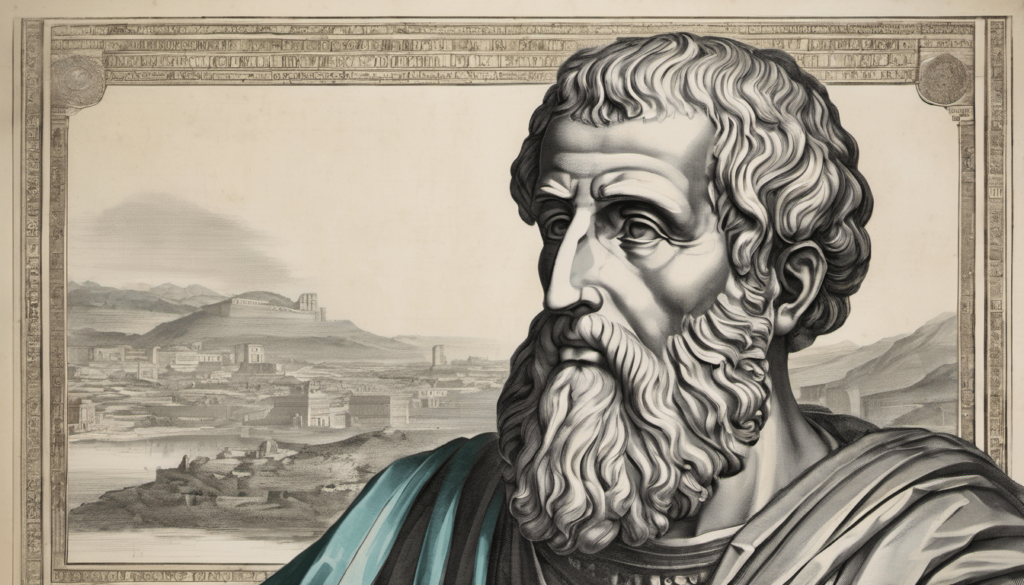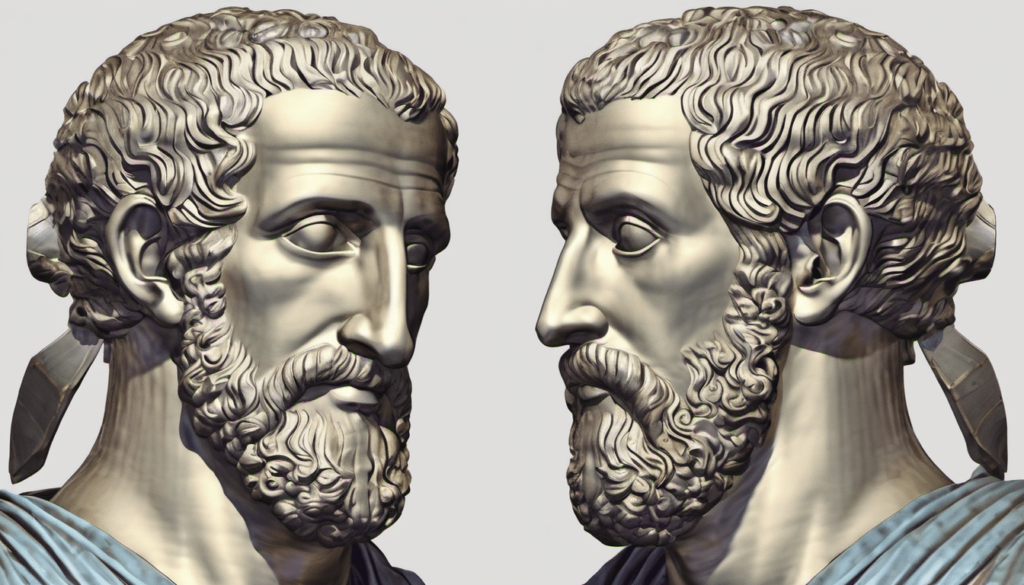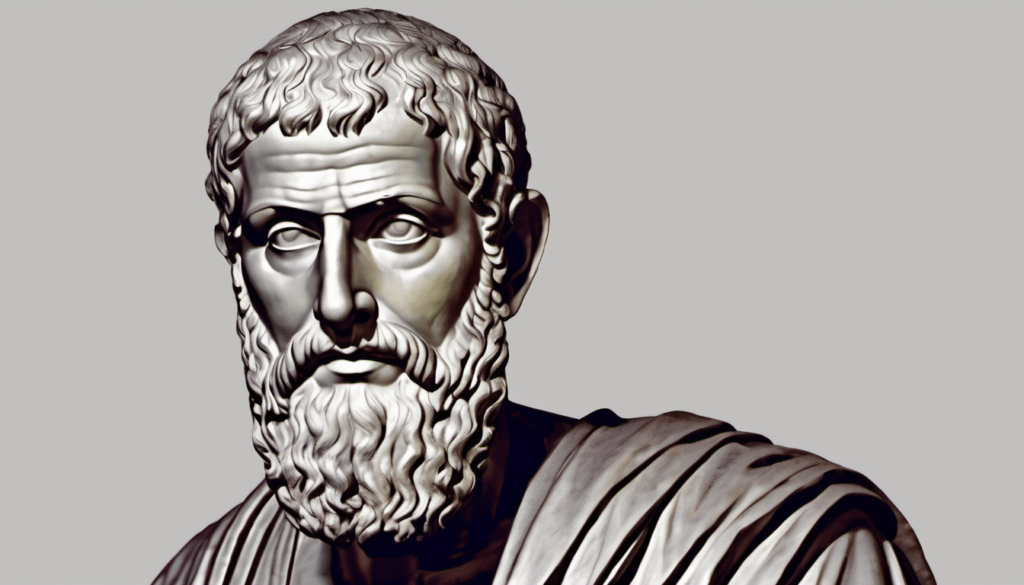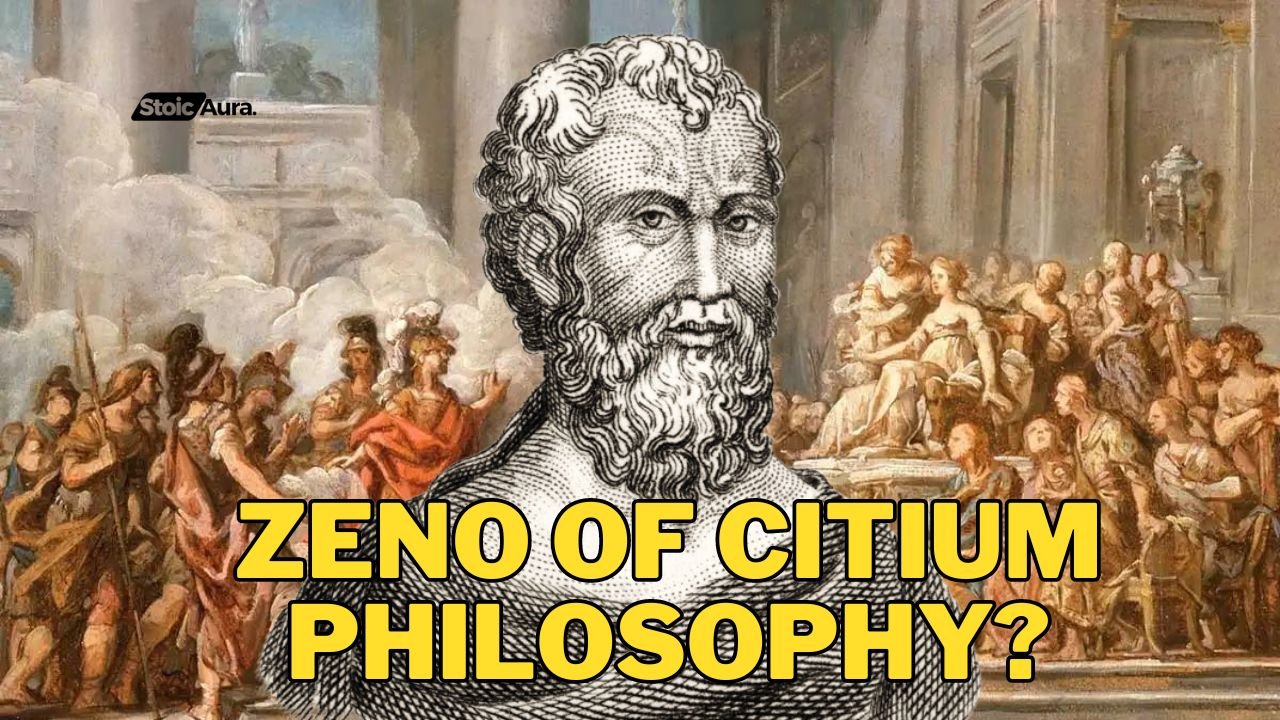I. Introduction

- Brief background on Zeno of Citium and his significance in ancient philosophy
Zeno of Citium, a towering figure in ancient philosophy, laid the cornerstone of Stoicism, an enduring school of thought that continues to shape ethical discourse. Born in Cyprus around 334 BCE, Zeno’s philosophical journey began after a shipwreck led him to Athens. Influenced by the teachings of Cynics and Megarians, he forged a distinctive philosophy emphasizing virtue, rationality, and the pursuit of a tranquil life. Zeno’s Stoicism centered on the belief that individuals could attain eudaimonia, or flourishing, by cultivating wisdom and moral excellence, while detaching themselves from external circumstances beyond their control.
As the founder of the Stoic school, Zeno attracted disciples who further developed and popularized his teachings. His impact extended beyond his lifetime, leaving an indelible mark on ancient philosophy. Zeno’s Stoicism endures as a guiding light for those seeking inner resilience and ethical living, emphasizing the profound influence one’s mindset can have on navigating life’s challenges. In exploring Zeno’s philosophy, one discovers not just a historical figure but a timeless source of wisdom that continues to resonate in the contemporary world.
- Establish the focus on Zeno’s philosophy and its enduring influence
Zeno’s philosophy stands as an enduring beacon in the vast landscape of ancient thought, particularly in the realm of Stoicism. Rooted in virtue, reason, and resilience, Zeno’s teachings have left an indelible mark on the philosophical heritage. His emphasis on living in accordance with nature, cultivating inner strength, and maintaining equanimity in the face of adversity resonates across centuries. The Stoic principles set forth by Zeno continue to inspire individuals seeking guidance in navigating life’s complexities. By prioritizing virtue and rationality, Zeno advocated for a resilient mindset, urging people to focus on what is within their control and accept what lies beyond it.
This philosophical approach to life remains relevant today, offering solace and wisdom in the pursuit of a meaningful and harmonious existence. As we delve into Zeno’s philosophy, we embark on a journey of self-discovery, guided by principles that transcend time and circumstance, inviting us to contemplate and integrate these timeless insights into our contemporary lives. Zeno’s legacy endures, reminding us that the pursuit of virtue and inner tranquility is a path well worth exploring in the quest for a fulfilled and purposeful life.
II. Zeno of Citium’s Philosophical Tenets

A. Stoicism at the Core
- Explore the foundational principles of Stoicism in Zeno’s philosophy
At the core of Zeno’s philosophy lies the rich tapestry of Stoicism, a school of thought that has endured the sands of time. Zeno, the founder of Stoicism, crafted a philosophical framework that resonates with timeless wisdom. Emphasizing the cultivation of virtue, Stoicism, as envisioned by Zeno, encourages individuals to align their lives with nature, embracing reason and resilience. In navigating the complexities of existence, Zeno urged a focus on internal well-being and the development of a steadfast character. The Stoic principles, rooted in Zeno’s teachings, advocate for a serene acceptance of life’s vicissitudes and an unwavering commitment to moral excellence.
As we delve into the foundational tenets of Stoicism within Zeno’s philosophy, we find a blueprint for navigating the human experience with grace and purpose. By weaving virtue, wisdom, and self-discipline into the fabric of daily life, Zeno’s Stoicism offers a timeless guide for individuals seeking not only to understand the world around them but also to cultivate a resilient and virtuous inner self. Through the lens of Zeno’s philosophy, the ancient echoes of Stoicism reverberate, providing a sturdy foundation for the pursuit of a meaningful and fulfilling life.
- Discuss how Zeno’s teachings emphasized virtue, wisdom, and self-control
Zeno’s profound teachings serve as a beacon guiding individuals toward a life infused with virtue, wisdom, and self-control within the realm of Stoicism. His philosophy imparts the importance of virtue as the cornerstone of an ethical life. Zeno envisioned a path where individuals, through wisdom and reason, could cultivate an inner moral compass, navigating the complexities of existence with grace. In the tapestry of Stoicism, self-control emerges as a powerful thread, urging practitioners to master their emotions and desires, fostering resilience in the face of adversity.
Zeno’s emphasis on self-discipline is not a stifling restraint but a liberating force, offering individuals the autonomy to shape their responses to external circumstances. The Stoic philosophy championed by Zeno advocates for a harmonious alignment with the natural order, encouraging individuals to embrace reason and live in accordance with universal principles. As we explore Zeno’s teachings, we uncover a roadmap for personal growth that extends beyond the confines of his era, resonating with timeless relevance. The legacy of virtue, wisdom, and self-control, imprinted in Zeno’s philosophy, stands as an enduring testament to the enduring power of Stoicism in shaping a life of purpose and fulfillment.
B. Contributions to Philosophy**
- Examine Zeno’s notable contributions to ethical and moral philosophy
Zeno, a luminary in the realm of philosophy, left an indelible mark with his profound contributions to ethical and moral thought within Stoicism. His philosophical endeavors resonated with an unwavering commitment to virtue, propelling individuals toward a life guided by moral excellence. Zeno envisioned virtue not as an abstract concept but as a practical guide, urging individuals to align their actions with ethical principles. His teachings emphasized the cultivation of wisdom, asserting that a life well-lived is rooted in a deep understanding of the self and the world.
Zeno’s Stoicism, a philosophy grounded in reason and self-discipline, provided a robust framework for navigating the complexities of human existence. It championed the idea that true freedom lies in mastering one’s desires and emotions, fostering resilience and inner strength. As we delve into Zeno’s ethical philosophy, we uncover a timeless reservoir of wisdom that transcends the boundaries of time, resonating with individuals seeking a meaningful and virtuous life. Zeno’s legacy in Stoicism remains an enduring source of inspiration, offering profound insights into the intricacies of ethical living and moral excellence.
- Highlight his influence on logic and metaphysics within the philosophical landscape
Zeno’s intellectual prowess extended beyond ethical considerations, leaving an indelible mark on the realms of logic and metaphysics within the philosophical landscape. In the rich tapestry of his philosophical legacy, Zeno’s contributions to logic stand out as a testament to his analytical acumen. His exploration of paradoxes, such as the famed Achilles and the Tortoise, challenged conventional understanding and laid the groundwork for advancements in logical reasoning.
Zeno’s metaphysical musings delved into the nature of reality, influencing subsequent philosophical discourse. By scrutinizing the essence of time, space, and existence, Zeno grappled with profound questions that continue to captivate contemporary thinkers. His dialectical prowess sparked a tradition of inquiry that shaped the evolution of philosophical thought. Zeno’s impact on logic and metaphysics showcases a multifaceted philosopher whose intellectual curiosity transcended conventional boundaries. As we navigate the corridors of philosophical exploration, Zeno’s contributions remain beacons of inspiration, inviting us to question, analyze, and unravel the intricate threads of reality in our pursuit of wisdom and understanding.
III. Zeno’s Life and Legacy

A. The Passing of Zeno
- Briefly touch on the circumstances surrounding Zeno’s death
Zeno of Citium’s remarkable philosophical journey met its earthly conclusion with the tranquility that mirrored his Stoic ideals. In a final act that resonated with the principles he espoused, Zeno faced his mortality with an unwavering calm. As the architect of Stoicism, Zeno’s teachings on the acceptance of fate and the impermanence of life manifested in his own passing. The details surrounding Zeno’s death may be elusive in historical records, yet the echoes of his philosophical legacy endure.
His departure serves as a poignant reminder of the Stoic commitment to facing life’s inevitable end with composure and an acceptance of the natural order. Zeno’s transition from the mortal realm underscores the profound connection between his life and the philosophy he cultivated—a philosophy that continues to inspire individuals to navigate the complexities of existence with wisdom, virtue, and an unwavering adherence to the Stoic ideals he so eloquently championed.
- Explore the symbolic aspects of Zeno’s life and his impact on philosophical thought
Zeno of Citium’s life stands as a symbol of profound philosophical influence, casting a long shadow over the landscape of ancient thought. As the progenitor of Stoicism, Zeno’s journey resonates as a testament to the enduring power of philosophical ideals. His emphasis on virtue, wisdom, and self-control not only shaped his personal ethos but left an indelible mark on the trajectory of ethical philosophy. Zeno’s teachings transcend the confines of his temporal existence, echoing through the annals of intellectual history.
The Stoic principles he propagated continue to serve as a guiding light for those navigating the complexities of life, offering a timeless framework for resilience and moral fortitude. Zeno’s legacy isn’t confined to his mortal years but extends into the fabric of philosophical thought, a profound influence that persists in inspiring individuals to cultivate inner strength, confront challenges with equanimity, and strive for a virtuous existence in the face of life’s uncertainties.
B. Powerful Ideas Persist
- – Showcase the enduring relevance of Zeno’s philosophy in modern times
Zeno of Citium’s philosophical legacy transcends the sands of time, resonating with modern seekers of wisdom and resilience. Rooted in Stoicism, Zeno’s teachings offer a timeless compass for navigating the complexities of contemporary life. His emphasis on virtue, self-control, and rationality provides a philosophical toolkit for individuals facing the challenges of the digital age. In a world often fraught with uncertainty, Zeno’s stoic principles serve as a sturdy anchor, encouraging a balanced approach to adversity and promoting personal growth.
Whether navigating the complexities of professional life or grappling with personal challenges, individuals can draw inspiration from Zeno’s enduring philosophy. The Stoic tenets championed by Zeno continue to find resonance in the pursuit of well-being, fostering a mindset that transcends temporal and cultural boundaries. In embracing Zeno’s wisdom, modern thinkers discover a timeless wellspring of guidance, empowering them to cultivate a resilient and virtuous existence in the face of life’s ever-evolving landscape.
- – Discuss how Zeno’s powerful ideas continue to shape ethical and moral discourse
Zeno of Citium’s philosophical contributions resonate powerfully in contemporary ethical and moral discussions, transcending the boundaries of time. His Stoic philosophy, grounded in virtue and self-discipline, has left an indelible mark on the landscape of ethical discourse. Zeno’s emphasis on living in accordance with nature and cultivating wisdom as a means to virtuous living offers a compelling framework for navigating the complexities of ethical decision-making. In an era where ethical considerations shape public dialogue, Zeno’s ideas provide a robust foundation for individuals and societies grappling with moral quandaries.
From personal conduct to societal values, Zeno’s stoic principles guide a thoughtful examination of ethics, fostering a discourse that seeks virtue and wisdom. As contemporary thinkers engage in discussions on morality and ethical responsibility, Zeno’s powerful ideas remain a beacon, illuminating a path toward a more principled and virtuous existence. By weaving Zeno’s philosophy into the fabric of modern ethical discourse, we draw from an ancient wellspring of wisdom, enhancing our understanding and shaping a more morally conscious and virtuous society.
# IV. Conclusion
- – Summarize the key takeaways from Zeno of Citium’s philosophy
Zeno of Citium’s philosophy, rooted in Stoicism, encapsulates timeless wisdom that resonates with contemporary seekers of virtue and understanding. Central to his teachings is the concept of living in harmony with nature, emphasizing the pursuit of wisdom and virtue as the cornerstone of a fulfilling life. Zeno’s Stoic principles provide a roadmap for navigating the complexities of existence, urging individuals to cultivate self-discipline, resilience, and moral integrity. His emphasis on differentiating between what is within and beyond our control offers a practical guide for managing life’s uncertainties.
Zeno’s powerful ideas extend beyond personal conduct, shaping ethical discourse and influencing the dialogue on societal values. In essence, Zeno’s philosophy serves as a beacon, illuminating a path toward a more principled, virtuous, and meaningful existence. As we distill the essence of Zeno’s teachings, we find enduring lessons in virtue, resilience, and ethical living, underscoring the timeless relevance of his philosophy in the pursuit of a well-lived life.
- – Encourage readers to reflect on Zeno’s teachings and consider their applicability in contemporary life
As we reflect on Zeno of Citium’s profound philosophical legacy, the relevance of his Stoic teachings becomes increasingly apparent in our modern lives. Zeno’s emphasis on cultivating virtue, navigating life’s challenges with resilience, and aligning our actions with nature serves as a timeless guide. In a fast-paced world filled with uncertainties, Zeno’s stoicism provides a steady anchor, encouraging individuals to introspect and adopt a more deliberate approach to living. His teachings prompt us to consider the impact of our choices on our character, urging us to prioritize wisdom and moral integrity.
By embracing Zeno’s philosophy, we discover a wellspring of strength to confront adversities and uncertainties. As we navigate the complexities of contemporary existence, Zeno’s Stoic principles offer a blueprint for ethical living and personal fulfillment. It’s an invitation to infuse our lives with the enduring wisdom of Zeno, finding solace and purpose in a philosophy that transcends time and resonates with the fundamental aspects of the human experience.
- – Invite comments and further exploration of Zeno’s powerful contributions to philosophy
I invite you, dear readers, to embark on a journey of exploration into the profound world of Zeno of Citium’s philosophy. As we unravel the layers of his Stoic teachings, there’s an opportunity for collective reflection and dialogue. What aspects of Zeno’s philosophy resonate with you? How do his powerful ideas influence your perspective on ethics and moral living? Share your thoughts, experiences, and insights in the comments below. Let this space be a forum for the exchange of ideas, where the wisdom of Zeno can inspire contemporary discussions.
Moreover, consider delving deeper into Zeno’s works and the broader realm of Stoicism. The more we delve into the intricacies of his philosophy, the more we uncover its timeless relevance and transformative potential. Let the conversation flow, and together, let’s uncover the enduring impact of Zeno’s contributions to philosophy, fostering a community dedicated to the exploration of wisdom, virtue, and the Stoic way of life.
(FAQs)
- Who was Zeno of Citium, and what is his significance in philosophy?
Zeno of Citium was an ancient Greek philosopher and the founder of Stoicism, a philosophical school that emphasizes virtue, wisdom, and self-control. His teachings had a profound impact on ethical and moral philosophy.
- What were the foundational principles of Zeno’s philosophy?
Zeno’s philosophy, known as Stoicism, focused on virtues such as wisdom, courage, justice, and temperance. He believed in living in accordance with nature and cultivating inner virtues to achieve a tranquil and fulfilling life.
- How did Zeno contribute to ethical and moral philosophy?
Zeno’s teachings emphasized the importance of virtue and self-control in leading a virtuous life. He provided practical guidance on ethical decision-making, advocating for living a life aligned with reason and nature.
- What were Zeno’s contributions to logic and metaphysics?
Zeno’s influence extended to logic and metaphysics, where he made notable contributions. His logical doctrines and views on the nature of reality have left a lasting impact on the broader philosophical landscape.
- Can you share insights into Zeno’s death and its significance?
The circumstances surrounding Zeno’s death are not well-documented, and there are various accounts. However, his legacy lives on through Stoicism, and his ideas continue to shape philosophical thought.
- **6. How is Zeno’s philosophy relevant in modern times?
Zeno’s powerful ideas on virtue, self-control, and ethical living remain relevant today. Many find guidance in Stoicism to navigate contemporary challenges and achieve personal well-being.
- What are the key takeaways from Zeno of Citium’s philosophy?
Key takeaways include the emphasis on virtue, living in accordance with nature, and the pursuit of a balanced and virtuous life. Zeno’s teachings provide valuable insights into personal development and ethical decision-making.
- How can readers apply Zeno’s philosophy in their daily lives?
Readers can apply Zeno’s philosophy by cultivating virtues, practicing self-discipline, and aligning their actions with reason and nature. Stoic principles offer practical guidance for facing challenges and fostering personal growth.







